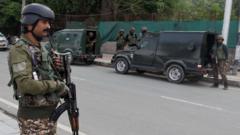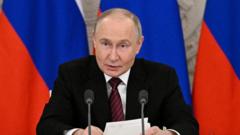The recent truce between India and Pakistan, brokered by the Trump administration, marks a significant moment in their longstanding conflict, with both sides eager to highlight their wins while navigating political sensitivities.
India and Pakistan Celebrate Hard-Fought Truce Amid Political Tension

India and Pakistan Celebrate Hard-Fought Truce Amid Political Tension
A tenuous cease-fire emerges after skirmishes, with both nations claiming success in the wake of U.S. mediation.
The delicate cease-fire between India and Pakistan appeared to be holding firm on its first day post-conflict, following a week marked by intense military engagements including drone strikes and shelling. The cease-fire was announced by President Trump, who underscored the U.S. mediation effort initiated to quell the hostilities that had risen to alarming levels.
In his statement, President Trump commended both countries for their resolve, acknowledging their potential to “avoid further aggression” that could have resulted in severe loss of life. He further asserted intentions to bolster trade relations significantly with India and Pakistan while stressing the importance of resolving their protracted disputes over the Kashmir region.
Pakistan's government welcomed the U.S. intervention, expressing appreciation for the role the Trump administration played in encouraging a cease-fire. However, political sensitivities emerged in India where officials viewed the mediation as a direct infringement on what has traditionally been portrayed as a bilateral issue. Shortly after the cease-fire was declared, Indian authorities asserted that the agreement had been reached solely through negotiations between Indian and Pakistani officials, sidelining external influence.
As both nations rally around their narratives of victory, the situation remains fragile, with the potential for flare-ups still looming if political tensions continue to simmer. The days ahead will be crucial as citizens and leaders alike navigate the complex aftermath of this recent conflict and the implications of foreign involvement in a matter deeply rooted in regional history.






















